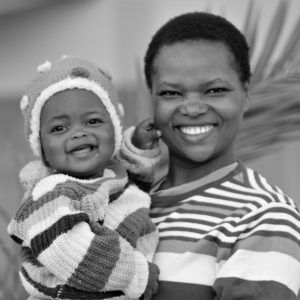Richter, one year ago, you came into my life.
You were born in one of the best hospitals in this country; your father, a doctor and a midwife were present to ensure everything would go well. Meanwhile, I was born in a thatched house by my mother. There was no midwife nor relative to witness my birth. My mother was alone, lonely, and in pain.
I remember a week after you were born, I went back to the clinic and the Pediatrician said, “Purity, you mean you have forgotten how to breastfeed!”
Breastfeeding, for sure, was the hardest skill I had to master! Everyone who visited me had an opinion. "Hold your breast like this, and the baby like that, sit upright, go buy a feeding pillow, apply arimis after feeding the baby..." How could I tell them that the breasts were in pain and that I was on a learning curve? I felt helpless and hopeless.
Richter, I have watched you grow from that tiny little thing to the young man you are now becoming. You are now running up and down, calling me “maaaaaaa”, proudly showing off your three teeth. You have brightened my life.
In becoming a mother, my experience is different from many women in this country. The majority of whom, just like my mother, in rural Kenya give birth outside of health facilities, without the care of a skilled birth attendant (midwife, nurse, doctor).
Although the president of Kenya abolished the delivery fees in all public health facilities on June 1, 2013, challenges such as lack of transport, long distances to health centres, poorly equipped health facilities, low quality of care in health facilities, traditional and cultural practices and now the novel coronavirus continue to hinder many families in rural areas from access to good quality maternal health and child care.
When you, my son, or I become the president of this country, the first priority will be on maternal health care, life begins at birth policy. The following will be my agenda items:
Agenda item #1: Increase resources needed to support a life begins at births policy
Many studies have pointed out that many women are now delivering in hospitals after the presidential directive in June 2013. However, human and material resources have not been increased to meet the increasing demand. There is a shortage of supplies, under-staffing of personnel and inadequate capacity of the existing infrastructure. This includes personnel, drugs, health facilities and equipment.
Agenda item #2: Give out-of-pocket payments to soon to be mothers
Many women walk to health centres to give birth, and others lack sanitary towels/cotton wools, baby clothes and even the needed high-nutrient food. We must learn from countries like Burkina Faso, where the Free Maternal Health Care Policy also takes care of such costs.
Agenda item #3: Create awareness
Because of their cultural norms and/or religion, many women in Kenya fail to seek medical help.
One researcher noted that:
“…Medicalisation of the birthing process that ignores social and traditional norms surrounding this family event is one of the reasons for home deliveries…”
There is a need to explore healthcare strategies that do not undermine people's way of life.
One day, my son, one day.
Also read: Lessons From My Mama: What Is Love?





